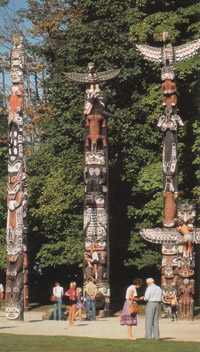|
● Welcome
to Canada/Bien Venu Au Canada
● The
Regions of Canada
● The
North
● The
West
● The
Prairies
● Central Canada
● The
Atlantic Region
● History
● What's in a
Name?
What's in a Name?
 What
does the word "Canada" mean? Its actual derivation
is uncertain, but many explanations exist. These stories about the
very word "Canada" are indications
of the diverse cultural background of the country. Some say
that it comes from the Spanish for "nothing here", which might well
have been the comments of the Spanish explorers who, looking for
a passage to Asia, encountered
this large, wild, forested, apparently unpopulated islands off the
west coast of the country. (In fact, it was explorers who mistook
Canada for India that began calling Aboriginal peoples "Indians"). What
does the word "Canada" mean? Its actual derivation
is uncertain, but many explanations exist. These stories about the
very word "Canada" are indications
of the diverse cultural background of the country. Some say
that it comes from the Spanish for "nothing here", which might well
have been the comments of the Spanish explorers who, looking for
a passage to Asia, encountered
this large, wild, forested, apparently unpopulated islands off the
west coast of the country. (In fact, it was explorers who mistook
Canada for India that began calling Aboriginal peoples "Indians").
 |
|
Totem Poles of
the First Nations People
|
 Others
suggest the name of Canada comes from one or more of the languages
spoken by the First
Nations (a term now use to describe original Canadians).
In Cree,
it means "clean land"; in Mohawk,
"castle"; to the Iroquois,
ka-na-ta meant "village". Others
suggest the name of Canada comes from one or more of the languages
spoken by the First
Nations (a term now use to describe original Canadians).
In Cree,
it means "clean land"; in Mohawk,
"castle"; to the Iroquois,
ka-na-ta meant "village".
 Place
names can tell us a lot about the history of Canada. We find English
rulers and nobles celebrated as in the provincial capitals of Halifax
and Victoria. There are also, of course, French names, especially
in Quebec (Montreal is the translation of "Mount Royal"). Other
names are vivid reflections
of the adventures of early explorers—you can wonder about how Medicine
Hat and Moosejaw,
both cities in Alberta, got their names. At Sioux
(pronounced "sue") Lookout
in Ontario, you can imagine early settlers keeping watch for native
Indians. Others, like Great Bear Lake and Buffalo Narrows, suggest
the dangerous forms of wildlife
that still roam
Canada. Place
names can tell us a lot about the history of Canada. We find English
rulers and nobles celebrated as in the provincial capitals of Halifax
and Victoria. There are also, of course, French names, especially
in Quebec (Montreal is the translation of "Mount Royal"). Other
names are vivid reflections
of the adventures of early explorers—you can wonder about how Medicine
Hat and Moosejaw,
both cities in Alberta, got their names. At Sioux
(pronounced "sue") Lookout
in Ontario, you can imagine early settlers keeping watch for native
Indians. Others, like Great Bear Lake and Buffalo Narrows, suggest
the dangerous forms of wildlife
that still roam
Canada.
Previous Page Next
Page
|

